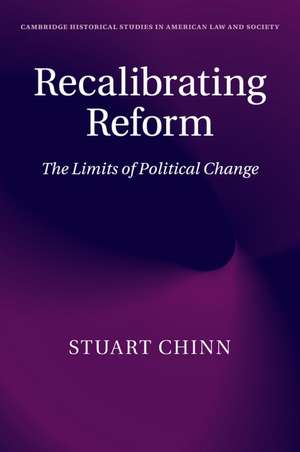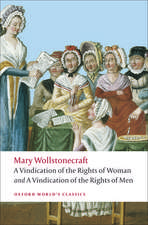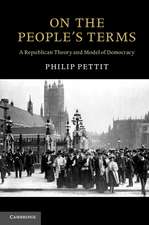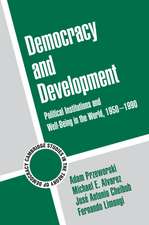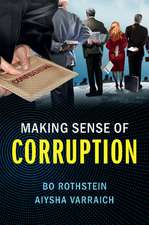Recalibrating Reform: The Limits of Political Change: Cambridge Historical Studies in American Law and Society
Autor Stuart Chinnen Limba Engleză Paperback – 15 mar 2017
| Toate formatele și edițiile | Preț | Express |
|---|---|---|
| Paperback (1) | 322.12 lei 6-8 săpt. | |
| Cambridge University Press – 15 mar 2017 | 322.12 lei 6-8 săpt. | |
| Hardback (1) | 485.46 lei 6-8 săpt. | |
| Cambridge University Press – 20 apr 2014 | 485.46 lei 6-8 săpt. |
Din seria Cambridge Historical Studies in American Law and Society
-
 Preț: 282.48 lei
Preț: 282.48 lei - 8%
 Preț: 392.23 lei
Preț: 392.23 lei -
 Preț: 350.46 lei
Preț: 350.46 lei -
 Preț: 179.45 lei
Preț: 179.45 lei -
 Preț: 266.97 lei
Preț: 266.97 lei -
 Preț: 180.21 lei
Preț: 180.21 lei -
 Preț: 375.69 lei
Preț: 375.69 lei -
 Preț: 278.34 lei
Preț: 278.34 lei -
 Preț: 294.57 lei
Preț: 294.57 lei - 11%
 Preț: 689.78 lei
Preț: 689.78 lei -
 Preț: 438.66 lei
Preț: 438.66 lei -
 Preț: 278.29 lei
Preț: 278.29 lei - 14%
 Preț: 759.00 lei
Preț: 759.00 lei -
 Preț: 239.66 lei
Preț: 239.66 lei -
 Preț: 188.27 lei
Preț: 188.27 lei -
 Preț: 409.22 lei
Preț: 409.22 lei -
 Preț: 287.07 lei
Preț: 287.07 lei -
 Preț: 274.88 lei
Preț: 274.88 lei - 14%
 Preț: 803.54 lei
Preț: 803.54 lei -
 Preț: 436.55 lei
Preț: 436.55 lei -
 Preț: 272.75 lei
Preț: 272.75 lei -
 Preț: 224.06 lei
Preț: 224.06 lei -
 Preț: 224.24 lei
Preț: 224.24 lei -
 Preț: 239.48 lei
Preț: 239.48 lei - 11%
 Preț: 652.59 lei
Preț: 652.59 lei -
 Preț: 269.09 lei
Preț: 269.09 lei -
 Preț: 312.62 lei
Preț: 312.62 lei - 14%
 Preț: 792.72 lei
Preț: 792.72 lei - 14%
 Preț: 687.06 lei
Preț: 687.06 lei -
 Preț: 270.63 lei
Preț: 270.63 lei -
 Preț: 268.51 lei
Preț: 268.51 lei -
 Preț: 439.80 lei
Preț: 439.80 lei - 11%
 Preț: 614.34 lei
Preț: 614.34 lei - 11%
 Preț: 654.29 lei
Preț: 654.29 lei
Preț: 322.12 lei
Nou
Puncte Express: 483
Preț estimativ în valută:
61.65€ • 64.12$ • 50.89£
61.65€ • 64.12$ • 50.89£
Carte tipărită la comandă
Livrare economică 14-28 aprilie
Preluare comenzi: 021 569.72.76
Specificații
ISBN-13: 9781107667389
ISBN-10: 1107667380
Pagini: 355
Ilustrații: 28 b/w illus.
Dimensiuni: 153 x 230 x 20 mm
Greutate: 0.52 kg
Editura: Cambridge University Press
Colecția Cambridge University Press
Seria Cambridge Historical Studies in American Law and Society
Locul publicării:New York, United States
ISBN-10: 1107667380
Pagini: 355
Ilustrații: 28 b/w illus.
Dimensiuni: 153 x 230 x 20 mm
Greutate: 0.52 kg
Editura: Cambridge University Press
Colecția Cambridge University Press
Seria Cambridge Historical Studies in American Law and Society
Locul publicării:New York, United States
Cuprins
Part I. Introduction: Introduction. Reconstructing governance; 1. The theory and political processes of recalibration; 2. The Supreme Court and transformative recalibration; Part II. Legal Reform and its Delimitation: 3. Emancipation, the reconstruction era, and delimitation; 4. Labor rights, the new deal era, and delimitation; 5. Constitutional equal protection, the civil rights era, and delimitation; 6. Explaining judicial delimiting behavior; Part III. The Construction and Maintenance of Governance: 7. The entrenchment and maintenance of the Jim Crow order; 8. The entrenchment and maintenance of industrial pluralism; 9. The entrenchment and maintenance of the anti-classification order; 10. Explaining order-affirming and tension-managing judicial behavior; 11. Conclusion; Acknowledgements; Bibliography.
Recenzii
'We celebrate great moments of legal change but fail to pay enough attention to the end of reform. Chinn's superb book challenges us all to rethink how courts apply, adjust, and sometimes frustrate landmark achievements of the people.' Robert L. Tsai, American University, Washington DC
'A remarkable and highly original book. Looking across the span of American history, Chinn identifies a recurring mismatch between major policy changes and their consequences: transformative legal and political decisions repeatedly result in substantially less-than-transformative governing arrangements. Chinn's innovative analysis will alter how scholars think about patterns of American political development and the significance of judicial power.' Keith J. Bybee, Paul E. and Hon. Joanne F. Alper '72 Judiciary Studies Professor, Syracuse University, New York
'How do constitutional revolutions end? Chinn puts the spotlight on this much-neglected question and provides a penetrating set of answers that set a new agenda in both law and political science.' Bruce Ackerman, Sterling Professor of Law and Political Science, Yale University, Connecticut
'This ambitious book makes a substantial contribution to our understanding of the role of the Supreme Court in American political development. Stuart Chinn has given us our first sustained exploration of the institutional dynamics of retrenchment and accommodation between old and new and conservative and liberal legal-constitutional orders. With great synthetic power and brilliant narrative detail, Chinn shows us how the court recurrently steps in to manage these clashes and fashion the new rules of the game.' William E. Forbath, Lloyd M. Bentsen Chair in Law and Professor of History, University of Texas, Austin
'Drawing on often opposed theories of judicial behavior and extensive historical research, Recalibrating Reform contends forcefully that judges, even the reform minded, are institutionally conditioned to resist major legal transformations - and so major political transformations. This convincing argument will influence scholars of judicial behavior and American constitutional development for years to come.' Rogers M. Smith, Christopher H. Browne Distinguished Professor of Political Science, University of Pennsylvania
'Recalibrating Reform is an illuminating work on the role of the US Supreme Court in social change. Stuart Chinn examines the aftermath of reform in the areas of race and labor, arguing that when the court takes up the intersection between new norms and preexisting legal frameworks, it narrows reform to negotiate between prior laws and the new regime. The court's effort to manage legal tension, Chinn argues, limits the possibilities of reform through courts. An original and important contribution.' Mary L. Dudziak, Asa Griggs Candler Professor of Law, Emory University, Atlanta
'A remarkable and highly original book. Looking across the span of American history, Chinn identifies a recurring mismatch between major policy changes and their consequences: transformative legal and political decisions repeatedly result in substantially less-than-transformative governing arrangements. Chinn's innovative analysis will alter how scholars think about patterns of American political development and the significance of judicial power.' Keith J. Bybee, Paul E. and Hon. Joanne F. Alper '72 Judiciary Studies Professor, Syracuse University, New York
'How do constitutional revolutions end? Chinn puts the spotlight on this much-neglected question and provides a penetrating set of answers that set a new agenda in both law and political science.' Bruce Ackerman, Sterling Professor of Law and Political Science, Yale University, Connecticut
'This ambitious book makes a substantial contribution to our understanding of the role of the Supreme Court in American political development. Stuart Chinn has given us our first sustained exploration of the institutional dynamics of retrenchment and accommodation between old and new and conservative and liberal legal-constitutional orders. With great synthetic power and brilliant narrative detail, Chinn shows us how the court recurrently steps in to manage these clashes and fashion the new rules of the game.' William E. Forbath, Lloyd M. Bentsen Chair in Law and Professor of History, University of Texas, Austin
'Drawing on often opposed theories of judicial behavior and extensive historical research, Recalibrating Reform contends forcefully that judges, even the reform minded, are institutionally conditioned to resist major legal transformations - and so major political transformations. This convincing argument will influence scholars of judicial behavior and American constitutional development for years to come.' Rogers M. Smith, Christopher H. Browne Distinguished Professor of Political Science, University of Pennsylvania
'Recalibrating Reform is an illuminating work on the role of the US Supreme Court in social change. Stuart Chinn examines the aftermath of reform in the areas of race and labor, arguing that when the court takes up the intersection between new norms and preexisting legal frameworks, it narrows reform to negotiate between prior laws and the new regime. The court's effort to manage legal tension, Chinn argues, limits the possibilities of reform through courts. An original and important contribution.' Mary L. Dudziak, Asa Griggs Candler Professor of Law, Emory University, Atlanta
Notă biografică
Descriere
Stuart Chinn highlights this phenomenon, dubbed 'recalibration', as a regular companion to reform, and highlights the barriers to, and possibilities for, change in American politics.
